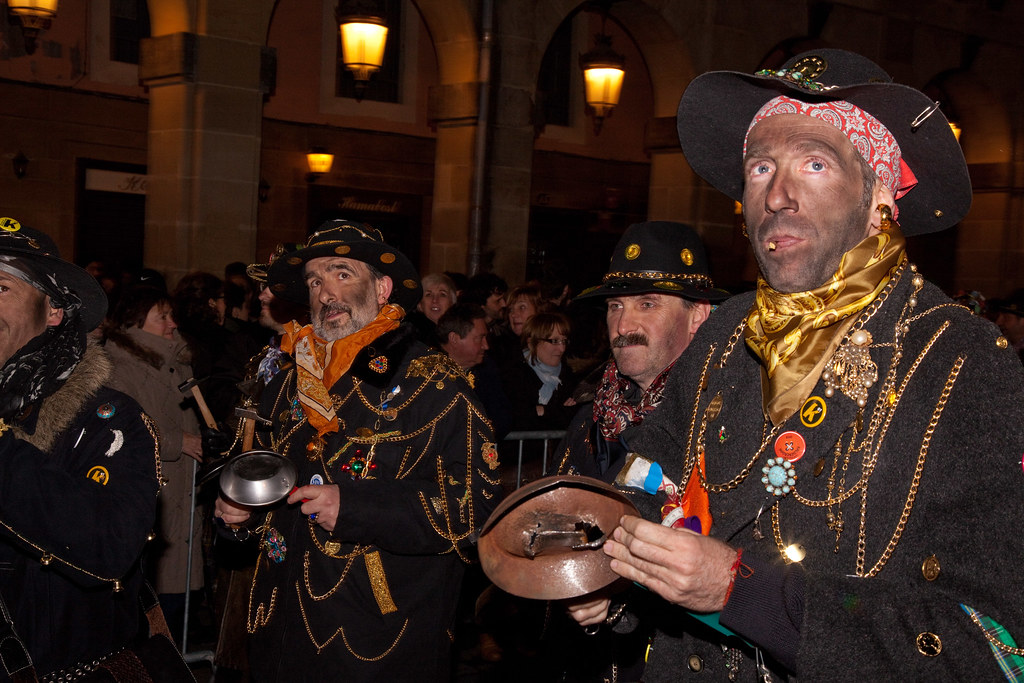The Psicollapse
Despite the completion of the 2020 Euskaraldia, there are still veneers in the streets of Pamplona, in this beginning of 2021. It also occurred in the first Euskaraldia: Many Basques from Navarre preferred to extend the time of wearing the Ahobizi or Belarriprest veneer. They saw a fundamental advantage: to get to know each other right away, to know that as they saw a plating, they would have the opportunity to speak in Basque with him. And many people, at least in the region of Pamplona, decided to make the most of the opportunity. I think some men took off the coats and put themselves in the closet with the veneer on.
This year I have seen fewer chaplains in Pamplona than in the first Euskaraldia, but it is also normal, because the pandemic has prevented us from walking more on the street, that the chaplains join more times with the Basques of the city, that we speak with more Basques (known and unknown). However, there are still veneers on the coats – I have also doubted: Will I get dressed again?” Because in Pamplona
it is difficult to start speaking in Basque if not with acquaintances.
"I wonder how it will be to speak in Basque with strangers without previous scanners, natural, without suspicion to receive a gesture of rejection or bitter refusal"
I'm always turned on a mental scanner. Will I try to speak in Basque? Will you know the Basque? Won't he feel bad? And suddenly, not always but on many occasions, in some way (an iepa may be enough), I realize that yes, that with that person I can speak in Basque, and, in some way, it accompanies me (speaks). These two things, the awareness and the wall of speaking in Euskera, produce in me an unexpected joy – and always remind me of the attachment that his father felt when a hospital nurse spoke to him in Euskera.
Sometimes I wonder how it will be to speak in Basque with strangers without previous scanners, natural, without suspicion to receive a gesture of rejection or bitter refusal. Or because you don't know Euskera without disturbing the other. Like in Spanish. And I tell myself that it's a little weird, with doubts, not with the message, but with the language with which the message is conveyed.
It's been four decades since I started Euskera, and I've rarely done Euskera without thinking about whether I'll have the "permission" to do it with a stranger.
That is why I understand very well those who do not want to take off the Euskaraldia veneer. The plates save us many psychosocial problems: seeing one – no matter if it is ahobizi or belarriprest – we can comfortably start in Basque with the carrier. We can give it the veneer with tranquility and comfort, in Basque.
Bidali zure iritzi artikuluak iritzia@argia.eus helbide elektronikora
ARGIAk ez du zertan bat etorri artikuluen edukiarekin. Idatzien gehienezko luzera 4.500 karakterekoa da (espazioak barne). Idazkera aldetik gutxieneko zuzentasun bat beharrezkoa da: batetik, ARGIAk ezin du hartu zuzenketa sakona egiteko lanik; bestetik, egitekotan edukia nahi gabe aldatzeko arriskua dago. ARGIAk azaleko zuzenketak edo moldaketak egingo dizkie artikuluei, behar izanez gero.
Zer jakin behar dut? Norekin erlazionatu behar dut? Non bizi behar dut? Ardura horiekin gabiltza gizakiok gure gizarteen baitan bizitza on baten ideia bizitzeko bidean. Ondo erantzuten ez badakigu, bazterretan geratuko garen beldurrez.
Joan den astean, kanpoan geratzearen... [+]
Gure lurraldeetan eta bizitzetan sortzen diren behar, desio eta ekimenen inguruan gero eta gehiago entzuten dugu harreman eta proiektu publiko-komunitarioak landu beharraz, eta pozgarria da benetan, merkaturik gabeko gizarte antolaketarako ezinbesteko eredua baita. Baina... [+]
We have renewed the dialogue in the secretariat of the faculty, for the most auspicious: they are far away, for their enrollment, the times when only the students came. The trend has changed for a long time, and parents – most notably mothers – are taking an increasingly... [+]
The argument of a syllogism has three propositions, the last of which is necessarily deduced from the other two. It is with this deductive logic that I can analyze, for me, the long and traumatic socioecological conflict in Carpinteria that is taking place in Navarre.
The... [+]
I have recently worked in class on Etxahun Barkox’s beautiful and touching cobla. The bad guy! The afflictions of the house began because of the creation of the “praube with beauty”, but in seventeen years she had entered the sea of misfortune, having to abandon the girl... [+]
Azken egunak garrantzi handikoak izan dira Bartzelonan, etxebizitzaren aldeko mugimenduarentzat eta espekulatzaileen aurkako borrokarentzat. Urtarrilaren 28an, polizia-armada batek Raval auzoko Massana Zaharrari [zentro sozial okupatua] eraso egin zion goizaldean, aurrez abisatu... [+]
I don't want my daughter disguising herself as a Gypsy in the caldereros. I don’t want Gypsy children at my daughter’s school to dress up as Gypsies in caldereros. Because being a gypsy is not a disguise. Because being a gypsy is not a party that takes place once a year, with... [+]
The road goes by steps, and I learned a little while ago that it seems to have already begun. But people also want to learn to fill that sentence with content. Alone we could achieve little, maybe even resignation as soon as we started. Gathering huge crowds can also complicate... [+]
Ez zuen egoki jokatu, neurriak hartu behar ziren, bestela, ez dugu ikasten. Itxuraz, ez zen ohartzen egindakoaren inpaktuaz, normal jarraitzen zuen, batzuetan, ingurukoek baino itxura zoriontsuagoz. Gainera, altuegi hitz egiten du, hori ez zaio inori gustatzen. Darabiltzan... [+]
The Department of Education doesn't understand why public employees have gone on strike. He's got to ask the LAB Syndicate. This union signed an agreement with the department in April 2023. Two years later they have also called for a strike because, unlike the previous ones, the... [+]
Erretiratu berri den lankide-ohi baten omenez, Historiako irakaslea. Bejondeizula!
Hezkuntza-legeek azpimarratzen dute zein garrantzitsua den ikasleengan pentsamendu kritikoa sustatzea. Baina irakasle-klaustroak, garai batean ideien eztabaidarako eta proposamenak... [+]
The liberal democracy of the Western countries has a growing appearance of a minimalist democracy. At the heart of the definition would be respect for changes in government through elections. The authoritarian variant of this was called competitive authoritarianism by political... [+]
























